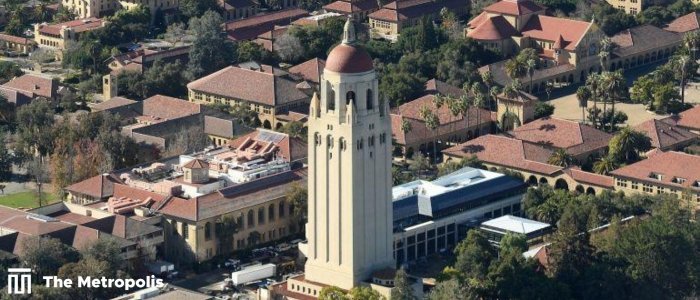Stanford University is considered one of the premier research universities in the United States [File: Noah Berger/Reuters]
Metropolis Desk-
Following an independent review that uncovered “substandard practices” in research publications he was associated with, the president of Stanford University resigned.
The president of the prominent university in California, Marc Tessier-Lavigne, announced on Wednesday that he would step down from his position as of August 31.
U.S. media reports had questioned “falsified data” in studies involving Tessier-Lavigne, a well-known neuroscientist from Ontario, Canada.
But on Monday, a scientific panel appointed by Stanford’s Board of Trustees exonerated Tessier-Lavigne of any wrongdoing, despite discovering “serious flaws” in the studies it had examined.
“The Panel has identified evidence of manipulation of research data in at least four of the five primary papers at issue,” it reported in a report.
“But the Panel found no evidence to conclude that Dr. Tessier-Lavigne participated in, oversaw, or was aware of the misconduct at the time it occurred,” the report states.
However, Tessier-Lavigne was criticized for failing to “decisively and forthrightly correct mistakes in the scientific record” even though the group concluded that “a scientist exercising reasonable care could not have been expected” to identify the research defects at the time.
Tessier-Lavigne participated in 12 scientific articles, seven of which he was a “non-principal author” and five of which he was identified as a lead author. The panel, which was made up of neuroscientists, biologists, and one Nobel laureate, looked at these papers.
It said that the review required sorting through 50,000 papers and more than 50 meetings with witnesses and scandal participants. On the website PubPeer, where scientists may discuss and rate research online, doubts about Tessier-Lavigne’s scientific work began to surface.
There, critics like scientist Elisabeth Bik expressed worries about photos in Tessier-Lavigne’s research that appeared to have been digitally manipulated as early as 2015.
One particular study, which was published in the 2009 issue of the journal Nature, looked at the origins of Alzheimer’s patient’s brain degeneration.
The publication was praised as “groundbreaking research” by Tessier-Lavigne’s former employer, the biotech firm Genentech, who called it “an entirely new way of looking at the cause of Alzheimer’s disease, the sixth leading cause of death in the United States.”
“Because of this research, we are working to develop both antibodies and small molecules that may attack Alzheimer’s from a novel entry point and help the millions of people who currently suffer from this devastating disease,” the company wrote in its annual report.
But scientists struggled to reproduce the results documented in the 2009 paper, leading to questions about the accuracy of its data — or whether it had been falsified altogether.
The Stanford Daily, a student-run campus publication, published several articles over the past year that included quotes from Bik and other scientists, some of whom opted to maintain their anonymity. Tessier-Lavigne was ultimately determined to be “not reckless” in his scientific approach, but Monday’s independent evaluation did state that “there was apparent manipulation of research data by others.”
The panel concluded that prompt corrections, retractions, and “forthright and transparent actions” would have “better-served science and all concerned”.
The “correction of the scientific record” was demanded, and “significant action” was needed. Additionally, it mentioned Tessier-Lavigne’s current efforts to revoke several of the publications.
Tessier-Lavigne, for his part, has persisted in refuting claims of unethical behavior by pointing out that his career covers three decades and hundreds of research papers.
He announced his resignation on Wednesday, saying, “I am pleased that the Panel concluded that I did not engage in any fraud or falsification of scientific data.”
“As I have clearly indicated, I have never submitted a scientific study unless I was absolutely certain that the facts were true and presented appropriately. The report from today backs up that assertion.
In the heart of Silicon Valley, Stanford is one of the most prestigious private research universities in the US. It has a reputation for producing notable alumni, from world leaders like the Prime Minister of the United Kingdom Rishi Sunak to tech entrepreneurs like Elon Musk, who reportedly dropped out after two days.
President Tessier-Lavigne has held the position for almost seven years. Beginning in September, Richard Saller will take over as acting president.
Source- Al Jazeera



